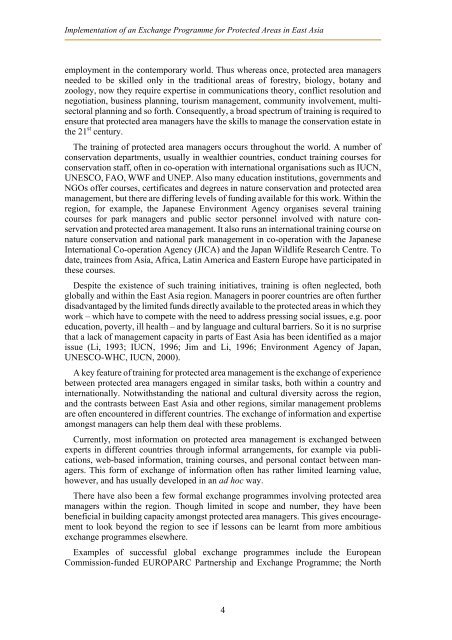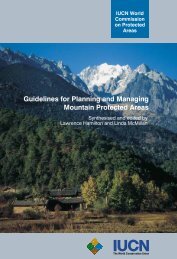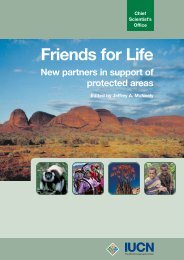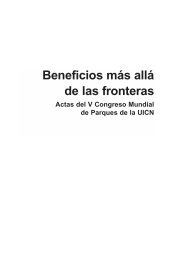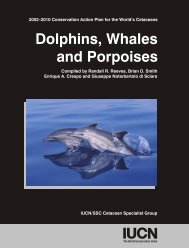Exchange programmes - IUCN
Exchange programmes - IUCN
Exchange programmes - IUCN
Create successful ePaper yourself
Turn your PDF publications into a flip-book with our unique Google optimized e-Paper software.
Implementation of an <strong>Exchange</strong> Programme for Protected Areas in East Asia<br />
employment in the contemporary world. Thus whereas once, protected area managers<br />
needed to be skilled only in the traditional areas of forestry, biology, botany and<br />
zoology, now they require expertise in communications theory, conflict resolution and<br />
negotiation, business planning, tourism management, community involvement, multisectoral<br />
planning and so forth. Consequently, a broad spectrum of training is required to<br />
ensure that protected area managers have the skills to manage the conservation estate in<br />
the 21 st century.<br />
The training of protected area managers occurs throughout the world. A number of<br />
conservation departments, usually in wealthier countries, conduct training courses for<br />
conservation staff, often in co-operation with international organisations such as <strong>IUCN</strong>,<br />
UNESCO, FAO, WWF and UNEP. Also many education institutions, governments and<br />
NGOs offer courses, certificates and degrees in nature conservation and protected area<br />
management, but there are differing levels of funding available for this work. Within the<br />
region, for example, the Japanese Environment Agency organises several training<br />
courses for park managers and public sector personnel involved with nature conservation<br />
and protected area management. It also runs an international training course on<br />
nature conservation and national park management in co-operation with the Japanese<br />
International Co-operation Agency (JICA) and the Japan Wildlife Research Centre. To<br />
date, trainees from Asia, Africa, Latin America and Eastern Europe have participated in<br />
these courses.<br />
Despite the existence of such training initiatives, training is often neglected, both<br />
globally and within the East Asia region. Managers in poorer countries are often further<br />
disadvantaged by the limited funds directly available to the protected areas in which they<br />
work – which have to compete with the need to address pressing social issues, e.g. poor<br />
education, poverty, ill health – and by language and cultural barriers. So it is no surprise<br />
that a lack of management capacity in parts of East Asia has been identified as a major<br />
issue (Li, 1993; <strong>IUCN</strong>, 1996; Jim and Li, 1996; Environment Agency of Japan,<br />
UNESCO-WHC, <strong>IUCN</strong>, 2000).<br />
A key feature of training for protected area management is the exchange of experience<br />
between protected area managers engaged in similar tasks, both within a country and<br />
internationally. Notwithstanding the national and cultural diversity across the region,<br />
and the contrasts between East Asia and other regions, similar management problems<br />
are often encountered in different countries. The exchange of information and expertise<br />
amongst managers can help them deal with these problems.<br />
Currently, most information on protected area management is exchanged between<br />
experts in different countries through informal arrangements, for example via publications,<br />
web-based information, training courses, and personal contact between managers.<br />
This form of exchange of information often has rather limited learning value,<br />
however, and has usually developed in an ad hoc way.<br />
There have also been a few formal exchange <strong>programmes</strong> involving protected area<br />
managers within the region. Though limited in scope and number, they have been<br />
beneficial in building capacity amongst protected area managers. This gives encouragement<br />
to look beyond the region to see if lessons can be learnt from more ambitious<br />
exchange <strong>programmes</strong> elsewhere.<br />
Examples of successful global exchange <strong>programmes</strong> include the European<br />
Commission-funded EUROPARC Partnership and <strong>Exchange</strong> Programme; the North<br />
4


